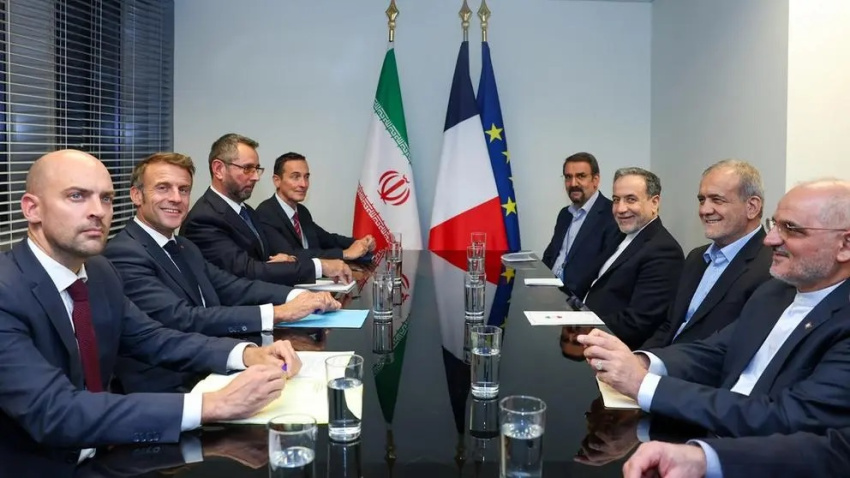Can Macron Mediate Between Trump and Iran?

As the second Trump administration begins to roll out its foreign policy vision and agenda in the coming days and weeks ahead, the issue of tensions between Tehran and Washington looms large. Trump has selected a number of anti-Iran 'hawks' for top cabinet posts, who are on record favoring the resumption of "maximum pressure" campaign -- that dominated the first Trump administration.
At the same time, President Trump himself has evinced a second tendency toward meaningful diplomacy with Iran, most vividly demonstrated at the G7 summit in August, 2019, when Trump expressed interest in meeting Iran's foreign minister, Javad Zarif, who had been unexpectedly invited by President Macron on the sideline of the summit; by all indications, Trump was held back by his foreign policy team, who abhored the thought of any direct contact between Trump and the Iranian officials.*
But, much has happened since then and Trump has now prioritized peace and stability in the Middle East, taking credit for the fragile ceasefire in Gaza and, to a lesser extent, through his special Middle East envoy, for the ceasefire in Lebanon, also scene to active French peace diplomacy.
Henceforth, the big question is if President Macron can capitalize on his special bond with President Trump, vividly demonstrated in their warm embrace at Notre Dame's opening ceremony, where Trump emphasized his productive collaboration with Macron in solving "many problems" around the world, in order to reach a breakthrough in the stalemated US-Iran relations?
By all indications, the answer to this question may need to await a preliminary improvement in Iran-EU dialogue, above all on the nuclear issue. Recently, President Macron has warned that Iran's nuclear program is nearing the weaponization level to the "point of no return," combined with a dire warning by the EU-3 (i.e., France, England, and Germany) that the window of opportunity for Iran to escape the "trigger mechanism" of the 2015 nuclear agreement for renewed UN sanctions will close in a precious few months. In other words, the next few months are extremely crucial for nuclear diplomacy with Iran and, inevitably, the possibility of a heightened Iran nuclear crisis (with a potential military dimension) looms on the horizon, warranting Macron's crisis-prevention intervention; this intervention needs to be realistic and keep in mind that Iran's latent nuclear deterrence is a fait accompli and it is futile to seek the dispossession of Iran's NPT-based nuclear fuel cycle.
No doubt, for its part, Tehran would need to take the necessary confidence-building steps, such as reaching a new agreement with the atomic agency to resolve the outstanding nuclear issues and to demonstrate greater nuclear transparency, before Macron would bother to assume the role of a mediator between Washington and Tehran. Also, positive movements by Iran on the thorny issue of human rights in Iran would be considered as welcome steps influencing the climate between Tehran and Europe. The Iranian domestic situation, marred by economic difficulties and rising popular discontent, is potentially volatile and might get even worse if Trump implements a new phase of maximum pressures, in which case Iran's rulers might opt for more rather than less repression.
In France, on the other hand, Macron is still grappling with the loss of his top diplomatic advisor, Emmanuel Bonne, who was a voice of reason and clarity; weakened at home with waning European influence, Macron is now surrounded by hawkish (neo-conservative) candidates vying for Bonne's position and seeking greater synergy with Trump's pro-Israel orientation. Thus, Macron faces his own challenges and must make the right decision in the coming days, otherwise he loses an important opportunity for France's MidEast policy.
Meanwhile, the Gaza ceasefire has generated the momentum for a new dialogue between Iran and the west, particularly since the fall of Iran's ally in Syria, Bashar al-Assad, has jolted Iran in the direction of a more nationalist and self-centered foreign policy posture, steered by President Pezeshkian and his foreign policy team; the latter recently balked at the idea of entering into a strategic relations with Putin's Moscow and or recognizing Russia's annexations of parts of Ukraine, in favor of a more balanced foreign orientation.
President Macron can, hypothetically speaking, engage in a preliminary "quiet diplomacy" with Iran to 'test the water' so to speak, as a prelude for a more overt intervention as a key interlocutor between Tehran and Washington. Macron's special bond with Trump is, indeed, a major asset in this regard, affecting the larger issues of war and peace in the turbulent Middle East. But, time is of essence and, as usual, it takes two to tango, as the saying goes'; the diplomatic dance between France and Iran must commence immediately, the sooner, the better.

